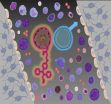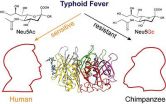INFORMATION:
Female sex hormones can protect against the development of some blood disorders
The study opens the way to a possible use of tamoxifen -- a drug used extensively in the treatment of breast cancer -- for a type of blood disorder for which there is currently no cure
2014-12-04
(Press-News.org) This discovery has a potential application in the treatment of certain blood disorders for which there is currently no cure. The study was led by Dr. Simón Méndez-Ferrer of the CNIC, working in partnership with the laboratories of Doctors Jürg Schwaller and Radek Skoda of the University Hospital in Basel (Switzerland). The study's authors have demonstrated in mice that tamoxifen, a drug already approved and widely used for the treatment of breast cancer, blocks the symptoms and the progression of a specific group of blood disorders known as myeloproliferative neoplasms.
Dr. Méndez-Ferrer explains that scientists have known for some time that men have a higher risk than women of developing leukemia: "We didn't know the causes off this different incidence of leukemia between men and women, but sex hormones like estrogen could at least partly explain these differences." Although estrogens were known to regulate some types of blood cells, very little was known about their influence on blood stem cells, including those that cause myeloproliferative neoplasms.
From this starting point, the researchers discovered an important practical application. "In this study we demonstrate that tamoxifen has specific effects on certain cells in the bone marrow, the hematopoietic stem cells and their immediate descendants, known as multipotent progenitors," explains study author Abel Sánchez-Aguilera.
The researchers found that tamoxifen had very distinct effects depending on whether the mice were healthy or sick. When administered to healthy animals, tamoxifen induced cell death of the multipotent progenitors, whereas the stem cells accelerated their division and partially lost their functionality. But when tamoxifen was administered to sick animals, symptoms disappeared and disease progression was blocked. In short, an effective therapy.
And there's another advantage. Surprisingly, these effects cause hardly any discernable alteration in the rest of the blood cells, which are maintained at normal levels even after prolonged treatment with the drug, showing no appreciable toxicity. Unlike the situation in breast cancer, where tamoxifen blocks the action of estrogens, in blood cells the team found that the drug acts by imitating the function of the hormone.
Myeloproliferative neoplasms, like polycythemia vera, are frequent tumors caused by a mutation in the gene that produces the protein JAK2 in hematopoietic stem cells. These diseases currently have no effective cure apart from bone marrow transplant, which is only possible for a small fraction of patients. The disease causes an accumulation of abnormal blood cells and the degeneration of the bone marrow, and in mice both these processes are blocked by treatment with tamoxifen. The treatment is able to eliminate the abnormal stem cells, the root cause of the disease, something that current therapies, including JAK2 inhibitors, don't manage.
Dr. Simón Méndez-Ferrer points out that "although we don't know yet exactly why, tamoxifen appears to have a stronger effect on leukemic cells than on the healthy ones, which allows the disease to be blocked without producing major secondary effects on normal blood cells."
One of the most remarkable features of this study is its potential for translation to clinical practice in a relatively short time. The study's lead author concludes, "The fact that tamoxifen is already approved for clinical use and has an appropriate safety profile enormously increases the chances of these results leading to a clinical trial to test this potential therapy in patients with myeloproliferative neoplasms."
ELSE PRESS RELEASES FROM THIS DATE:
Wireless brain sensor could unchain neuroscience from cables
2014-12-04
PROVIDENCE, R.I. [Brown University] -- In a study in the journal Neuron, scientists describe a new high data-rate, low-power wireless brain sensor. The technology is designed to enable neuroscience research that cannot be accomplished with current sensors that tether subjects with cabled connections.
Experiments in the paper confirm that new capability. The results show that the technology transmitted rich, neuroscientifically meaningful signals from animal models as they slept and woke or exercised.
"We view this as a platform device for tapping into the richness of ...
Typhoid Mary, not typhoid mouse
2014-12-04
The bacterium Salmonella Typhi causes typhoid fever in humans, but leaves other mammals unaffected. Researchers at University of California, San Diego and Yale University Schools of Medicine now offer one explanation -- CMAH, an enzyme that humans lack. Without this enzyme, a toxin deployed by the bacteria is much better able to bind and enter human cells, making us sick. The study is published in the Dec. 4 issue of Cell.
In most mammals (including our closest evolutionary cousins, the great apes), the CMAH enzyme reconfigures the sugar molecules found on these animals' ...
Obesity and hypertension
2014-12-04
The link between obesity and cardiovascular diseases is well acknowledged. Being obese or overweight is a major risk factor for the development of elevated blood pressure, and cardiovascular diseases. But it has net been known how obesity increases the risk of high blood pressure, making it difficult to develop evidence based therapies for obesity, hypertension and heart disease.
In a ground-breaking study, published today in the prestigious journal, Cell (embargo midday EST), researchers from Monash University in Australia, Warwick, Cambridge in the UK and several American ...
'Satiety hormone' leptin links obesity to high blood pressure
2014-12-04
Leptin, a hormone that regulates the amount of fat stored in the body, also drives the increase in blood pressure that occurs with weight gain, according to researchers from Monash University and the University of Cambridge.
Being obese or overweight is a major risk factor for the development of high blood pressure and cardiovascular disease. Whilst a number of factors may be involved, the precise explanation for the link between these two conditions has been unclear.
In a study published today in the journal Cell, a research team led by Professor Michael Cowley, ...
People with mental illness more likely to be tested for HIV, Penn Medicine study finds
2014-12-04
PHILADELPHIA--People with mental illness are more likely to have been tested for HIV than those without mental illness, according to a new study from a team of researchers at Penn Medicine and the U.S. Centers for Disease Control and Prevention (CDC) published online this week in AIDS Patient Care and STDs. The researchers also found that the most seriously ill - those with schizophrenia and bipolar disease - had the highest rate of HIV testing.
The study assessed nationally representative data from 21,785 adult respondents from the 2007 National Health Interview Survey ...
A poisonous cure
2014-12-04
EAST LANSING, Mich. - Take two poisonous mushrooms, and call me in the morning. While no doctor would ever write this prescription, toxic fungi may hold the secrets to tackling deadly diseases.
A team of Michigan State University scientists has discovered an enzyme that is the key to the lethal potency of poisonous mushrooms. The results, published in the current issue of the journal Chemistry and Biology, reveal the enzyme's ability to create the mushroom's molecules that harbor missile-like proficiency in attacking and annihilating a single vulnerable target in the ...
Research: NFL athletes are seeking unproven stem cell treatments
2014-12-04
Some National Football League (NFL) players have been seeking out unproven stem cell therapies to help accelerate recoveries from injuries, according to a new paper from Rice University's Baker Institute for Public Policy. While most players seem to receive treatment within the United States, several have traveled abroad for therapies unavailable domestically and may be unaware of the risks involved, the paper found.
The paper is published in the 2014 World Stem Cell Report, which is a special supplement to the journal Stem Cells and Development and is the official publication ...
Kent State researchers find more smartphone play equals less fun during leisure
2014-12-04
Today's smartphones are designed to entertain and are increasingly marketed to young adults as leisure devices. Not surprisingly, research suggests that young adults most often use their phones for entertainment purposes rather than for school or work.
With this in mind, three Kent State University researchers, Andrew Lepp, Ph.D., Jacob Barkley, Ph.D. and Jian Li, Ph.D., and a Kent State graduate student, Saba Salehi-Esfahani, surveyed a random sample of 454 college students to examine how different types of cell phone users experience daily leisure.
The trio from ...
Genome sequencing for newborns: What do new parents think?
2014-12-04
Boston, MA - A study published this week in Genetics in Medicine is the first to explore new parents' attitudes toward newborn genomic testing. The findings suggest that if newborn genomic testing becomes available, there would be robust interest among new parents, regardless of their demographic background.
The study, led by researchers at Brigham and Women's Hospital (BWH) and Boston Children's Hospital, found that the majority of parents surveyed were interested in newborn genomic testing.
As next-generation whole-exome and genome sequencing is integrated into clinical ...
Two in 10 adults seriously considered suicide in 2013, CAMH survey shows
2014-12-04
TORONTO, Dec. 4, 2014 - Results from an ongoing survey conducted by the Centre for Addiction and Mental Health (CAMH) show that 2.2 per cent of adults --or over 230,000 people in Ontario, Canada -- seriously contemplated suicide in the last year. The 2013 edition of the CAMH Monitor, released today, included questions about suicidal ideation for the first time in the survey's history.
"Suicide is a major public health issue, and these data confirm that large numbers of Ontario adults report having suicidal thoughts," said Dr. Hayley Hamilton, CAMH scientist and co-principal ...
LAST 30 PRESS RELEASES:
Striking genomic architecture discovered in embryonic reproductive cells before they start developing into sperm and eggs
Screening improves early detection of colorectal cancer
New data on spontaneous coronary artery dissection (SCAD) – a common cause of heart attacks in younger women
How root growth is stimulated by nitrate: Researchers decipher signalling chain
Scientists reveal our best- and worst-case scenarios for a warming Antarctica
Cleaner fish show intelligence typical of mammals
AABNet and partners launch landmark guide on the conservation of African livestock genetic resources and sustainable breeding strategies
Produce hydrogen and oxygen simultaneously from a single atom! Achieve carbon neutrality with an 'All-in-one' single-atom water electrolysis catalyst
Sleep loss linked to higher atrial fibrillation risk in working-age adults
Visible light-driven deracemization of α-aryl ketones synergistically catalyzed by thiophenols and chiral phosphoric acid
Most AI bots lack basic safety disclosures, study finds
How competitive gaming on discord fosters social connections
CU Anschutz School of Medicine receives best ranking in NIH funding in 20 years
Mayo Clinic opens patient information office in Cayman Islands
Phonon lasers unlock ultrabroadband acoustic frequency combs
Babies with an increased likelihood of autism may struggle to settle into deep, restorative sleep, according to a new study from the University of East Anglia.
National Reactor Innovation Center opens Molten Salt Thermophysical Examination Capability at INL
International Progressive MS Alliance awards €6.9 million to three studies researching therapies to address common symptoms of progressive MS
Can your soil’s color predict its health?
Biochar nanomaterials could transform medicine, energy, and climate solutions
Turning waste into power: scientists convert discarded phone batteries and industrial lignin into high-performance sodium battery materials
PhD student maps mysterious upper atmosphere of Uranus for the first time
Idaho National Laboratory to accelerate nuclear energy deployment with NVIDIA AI through the Genesis Mission
Blood test could help guide treatment decisions in germ cell tumors
New ‘scimitar-crested’ Spinosaurus species discovered in the central Sahara
“Cyborg” pancreatic organoids can monitor the maturation of islet cells
Technique to extract concepts from AI models can help steer and monitor model outputs
Study clarifies the cancer genome in domestic cats
Crested Spinosaurus fossil was aquatic, but lived 1,000 kilometers from the Tethys Sea
MULTI-evolve: Rapid evolution of complex multi-mutant proteins
[Press-News.org] Female sex hormones can protect against the development of some blood disordersThe study opens the way to a possible use of tamoxifen -- a drug used extensively in the treatment of breast cancer -- for a type of blood disorder for which there is currently no cure







